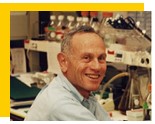NFCR Translational Research: Prostate Cancer
Molecular Imaging Detects Cancer-free Margins During Surgery

James P. Basilion, Ph.D. Case Western Reserve Univ. Cleveland, OH
The best chance of a cure for many early-stage cancers is complete, surgical resection. A challenge for surgeons is determining where cancer ends, and healthy tissue begins – known as ‘cancer margins’. Immediate margin detection can benefit many patients who otherwise must return for a second surgery after pathology lab results of surgery samples determine margins were not cancer-free. For example, in 25% of lumpectomies, breast cancer patients must return later for a second surgery. With NFCR funding since 2005, Dr. James Basilion developed molecular imaging light-emitting probes to bind only cancer cells. Surgeons quickly apply the probe and a camera visualizes any remaining cancer cells to be resected or the margins of the surgery are ‘cancer-free’.
Dr. Basilion formed the biotech company, Akrotome Imaging, to translate the molecular imaging probes into the clinics. With NFCR funding, the probe is being optimized in pre-clinical studies for detection of margins in breast cancer lumpectomies. After approval of the Initial New Drug (IND) from the FDA, the probe will enter Phase I clinical trials to improve cure rates for breast cancer. Light-emitting probes are under development for prostate cancer. Successful initial clinical trials of the probe for breast cancer will facilitate a future trial to benefit prostate cancer patients.
Multi-Action Gene Therapy for Prostate Cancer

Paul B. Fisher, M.Ph., Ph.D. Virginia Commonwealth University, Richmond, VA
NFCR funding since 2008 helped Dr. Paul Fisher think “outside the box” to develop IL/24 gene therapy (IL/24 is from the Interleukin gene family of immune system modulators).
He engineered IL/24 gene to reach cancer cells — at all sites in the body — to commit suicide (normal way cells die). Healthy cells are unaffected by IL/24 gene’s effects. IL/24 gene modulates the immune system to kill cancer, inhibits blood vessel formation to tumors to starve them of vital blood supply, and sensitizes cancer to radiation, chemotherapy and immunotherapy. IL/24 gene therapy is effective in models of prostate cancer among other cancer types.
Dr. Fisher formed the company, ILCT, Inc., (InterLeukin Combinatorial Therapies) to bring IL/24 gene therapy to clinical trials to benefit patients. The gene therapy is advancing through pre-clinical research first as a new treatment for fatal brain cancer, GBM (glioblastoma). This would facilitate future trials of IL/24 gene therapy for prostate cancer patients. IL/24 gene therapy is also effective in models of melanoma and colon, lung, bladder, liver, and pancreatic cancer, among other types.
Development of New Inhibitor of Cancer Invasion into Healthy Tissue and Metastasis

Paul B. Fisher, M.Ph., Ph.D. Virginia Commonwealth University, Richmond, VA
Invasion of cancer cells into healthy tissue is a hallmark property of cancer. MDA-9/Syntenin is a pro-invasion and pro-metastatic gene discovered by Dr. Paul Fisher with NFCR funds. With leading-edge chemistry and drug design techniques, his team developed the drug, PDZ1i, to inhibit invasion and metastasis properties of MDA-9/Syntenin. PDZ1i shows profound “anti-invasive” and “anti-metastatic” activity in models of melanoma and liver, lung, brain, pancreas, breast and prostate cancer and neuroblastoma. PDZ1i works well with chemotherapy, radiation, or immunotherapy to kill cancer cells. Patients with hepatocellular cancer (HCC)—the main type of liver cancer, need effective treatments to save their lives. NFCR funds are advancing the required pre-clinical research of PDZ1i to apply for the IND (Investigational New Drug) application and gain FDA approval for a Phase 1 clinical trial for HCC patients. Success in the trial for HCC patients will facilitate future trials of PDZ1i treatment for melanoma and other types of cancer.
Treatment in Clinical Trials for non-Hodgkin T-cell Lymphoma Shows Promise in Research for Prostate Cancer

Michael B. Sporn, M.D. formerly of Geisel School of Medicine at Dartmouth, Hanover, NH
Fenretinide, a drug similar in structure to Vitamin A, may offer patients non-Hodgkin T-cell Lymphoma a life-saving treatment. Previously, former NFCR-funded scientist, Dr. Michael Sporn, researched fenretinide and proved its safety in humans for other cancers. Subsequently, the drug demonstrated safety and effectiveness in patients. non-Hodgkin T-cell Lymphoma is toxic to cancer cells by activating the cell suicide pathway (apoptosis). Sci Tech, LLC, a small biotech company, discovered fenretinide reactivates the immune system to complement apoptosis and it is effective in models of non-Hodgkin T-cell Lymphoma, prostate cancer and other cancer types. Fenretinide will soon begin Enrollment in the Phase 1 trial for non-Hodgkin T-cell Lymphoma patients. NFCR’s support for SciTech helped develop a unique delivery system for fenretinide and gain FDA approval to treat non-Hodgkin T-cell Lymphoma patients who no longer respond to their current therapy. Success in clinical trials for these patients will facilitate a future clinical trial for patients with prostate and other types of cancer.
BASIC RESEARCH PROJECTS
Dr. Danny Welch and his team are exploring how mitochondria – a specialized cell part that generates energy for our bodies – may determine why breast cancer metastases develop in some patients, but not in others. Differences in tumor formation, metastasis location and responses to therapy could be from our mitochondrial DNA. This research may lead to a simple blood test to guide doctors in treating patients who are susceptible to metastasis and may need more aggressive treatment, or spare other patients of unnecessary harsh side effects.
Dr. Welch’s team has identified eight genes that get turned off when cancer cells become metastatic cells – known as ‘metastasis suppressor genes’. KISS1 gene was originally discovered in models of melanoma and his team determined that cells expressing KISS1 can complete all of the early steps of the metastatic process but do not form a new metastatic site. His team has shown the same results in prostate cancer models. This research can lead to unique anti-metastasis therapeutics that ‘mimic’ the ‘lost’ KISS1 protein to arrest formation of metastatic sites in prostate and other types of cancer.










